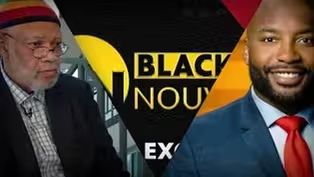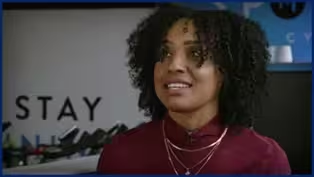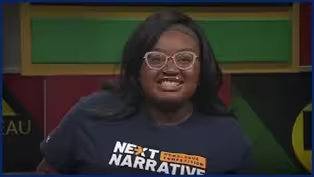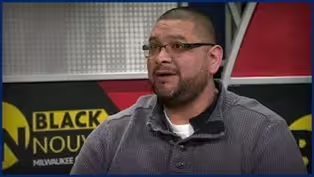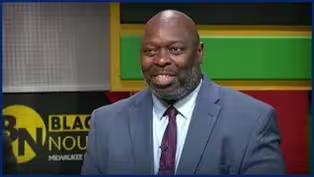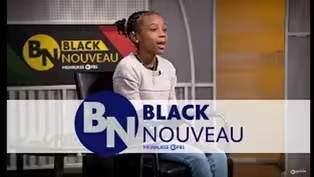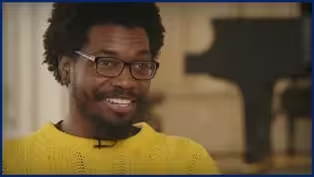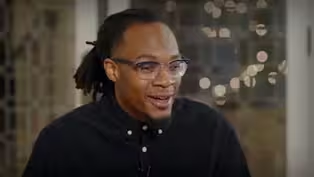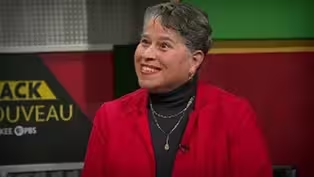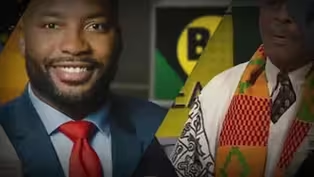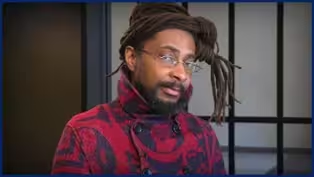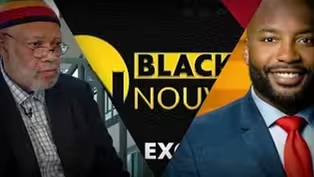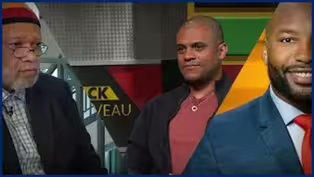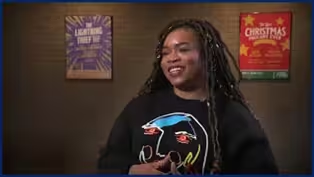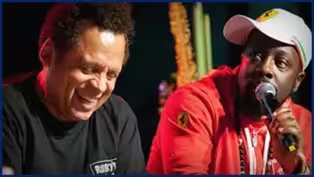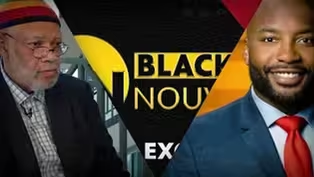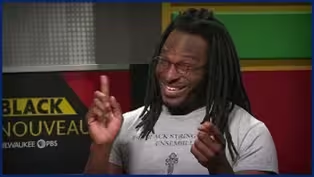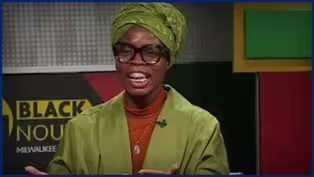Black Nouveau
My Way Out
Clip: Season 32 | 6mVideo has Closed Captions
Wisconsin has the highest Black incarceration rate in the country.
According to the Sentencing Project, Wisconsin has the highest Black incarceration rate in the country, with 1 in 36 Black Wisconsinites currently locked up. James Causey introduces us to Ruben Ganoa, founder of "My Way Out."
Problems playing video? | Closed Captioning Feedback
Problems playing video? | Closed Captioning Feedback
Black Nouveau is a local public television program presented by MILWAUKEE PBS
This program is made possible in part by the following sponsors: Johnson Controls.
Black Nouveau
My Way Out
Clip: Season 32 | 6mVideo has Closed Captions
According to the Sentencing Project, Wisconsin has the highest Black incarceration rate in the country, with 1 in 36 Black Wisconsinites currently locked up. James Causey introduces us to Ruben Ganoa, founder of "My Way Out."
Problems playing video? | Closed Captioning Feedback
How to Watch Black Nouveau
Black Nouveau is available to stream on pbs.org and the free PBS App, available on iPhone, Apple TV, Android TV, Android smartphones, Amazon Fire TV, Amazon Fire Tablet, Roku, Samsung Smart TV, and Vizio.
Providing Support for PBS.org
Learn Moreabout PBS online sponsorshipaccording to the sentencing project Wisconsin has the highest black incarceration rate in the country with one in 36 black Wisconsin kns currently locked up Ruben giona knows how difficult it is for the formerly incarcerated to get back on their feet after he was discharged from the Navy giona was arrested on a drug conviction and sentenced to 10 years after his release the father ofi was told he had to settle for minimum wage jobs he wanted more for himself and his family three years ago he started my way out a nonprofit program supporting nearly a thousand men and women in southeastern Wisconsin giona joins us now thank you for having me James hey thanks for joining us so how did you come up with the idea for my way out um actually it happened right after the pandemic when the pandemic happened on 2021 after we started seeing a lot more people getting released and not having the support service that they needed so you know I remember when I came home I wanted that way out but at the same time I wanted someone to empower me and make me feel that there is a way out so that's where the name came out like you know what let's Empower and reach the individuals and let's ask them what is their way out so that's how my way out was born really you know just providing the support services and meeting people where they're at instead of us telling them what you do is have them take charge um one of the things I realized when we get incarcerated the first thing that's taken away from you is your voice because you're told you have the right to remain silent and often we forget that we have a voice because we get incarcerated and we don't have a say while we're incarcerated so when we come out with like we want to empower you now you you have a voice here let us know how your re-entry Journey looks like and then we create a personalized re-entry plan what's the most significant needs for the formally incarcerated I would say you know it's it's it's funny because before the pandemic it was employment people were seeking employment couldn't find employment or sustainable living wage jobs and as soon as the pandemic happened and afterwards we started noticing in 2022 that housing has become a real serious need and issue people are coming out getting released and have nowhere to go um people don't have sometime family members and are getting released to being homeless so and often sometimes if they do have somewhere to go they might qualify for a temporary housing with uh Department of Corrections but it's only up to 30 or 60 days uh so housing has been one of the most important things right now and then Employment I think employment and uh Transportation follows right along um I think people are noticing that you know if you're able to find a a somewhere to lay your head and have to wear where you going to sleep then how do you sustain that and how do you find that employment that's going to pay you you know a su sustainable living wage so you could afford where to live and then Transportation comes comes right along with it like how do you get from to appointments to jobs often people still got to go see their probation officer so they have to be able to if leave her their jobs go to visit the PO then come back to the job so all those three I would say have been the most effective what agencies do you work with to find housing and employment actually we partner with every with everybody we're part of the Milwaukee reentry ccil that's about 70 organizations that you know we Network I'm real big and uh when I started this nonprofit I had came in it with like my military background of in order to see TR change we have to work with the mentality of one team one fight so this this is a problem that's affecting everybody so let's all just work together I'm a well known started off new organization so I know I don't have that much funding but the little I do have I'm able to provide and if I need additional resources I reach out to other organization that might be able to provide those Support Services when you say you meet people where they are what what do you mean by that so when I say we meet people where they at is if someone gets released um out of the Milwaukee Detention Facility and they got nowhere to go they'll pick us up they'll call us and we're come and pick them up and say where do you need to go you know what's your you got to go check your PO your probation officer you have to go check into your TSS let's take you um when we make appointments often people come out with no Transportation so we're asking them you know where are you staying at where can we meet you in a coffee shop and we come to you so we're able to create that personalized raning plant and provide that support service we're we're not telling them why you have to go over here no let us know what's easier for you you know let let's meet you at where you at what is where how does this look for you how does your journey look like and often you know people are shocked by that they're like oh that uh I don't have to go nowhere I was like no I you know we're remote so that gives us that flexibility to go and meet people where they're at measuring success how do you do that you know that's that's funny I think in the nonprofit world we always want to set measurables to like what services we're providing and all that I I take a different approach when it comes to muring success to me success is based on what the individual consider success often if that individual success is just to be able to get a bus pass you have transportation so he's able to look for jobs and we obtain him a bus path and that's and then he gets a job that's a right there in itself you know so I think when how I make success is however individual I'm working with or we're working with wherever they determine that their goal they've have accomplished whatever sucess they want not accomplished we got about 30 seconds left what would you say to encourage people to hire or give a second chance to someone who's just been released I want them to understand the mistakes do not define who they are you know but what we do afterwards we can only do something afterwards if a true opportunity is provided you know so that I I encourage people like really meet people where they provide that true opportunity because our mistakes do not define who we are it's it's what we do afterwards I appreciate you thank you so much thank you James for having [Music] me
Video has Closed Captions
Clip: S32 | 6m 22s | Souls To The Polls 2024 (6m 22s)
Recovering from Disordered Eating
Video has Closed Captions
Clip: S32 | 6m 26s | Recovering from Disordered Eating (6m 26s)
Video has Closed Captions
Clip: S32 | 6m | Wisconsin has the highest Black incarceration rate in the country. (6m)
Video has Closed Captions
Clip: S32 | 6m 3s | James Causey speaks with w Black Milwaukee Republican (6m 3s)
MLK Speech Writing Contest Winner Zaida Smith
Video has Closed Captions
Clip: S32 | 6m 32s | The 40th Annual MLK Speech Writing Contest Winner - Zaida Smith (6m 32s)
Video has Closed Captions
Clip: S32 | 6m 40s | Alexandria Mack profiles Mikhail Johnson, a Jamaican composer (6m 40s)
Video has Closed Captions
Clip: S32 | 7m 57s | January 2023 Edition of "Black Nouveau features a profile of Milwaukee native Malik Johnson (7m 57s)
Video has Closed Captions
Clip: S32 | 6m 52s | Former Black Nouveau host Joanne Williams discusses her documentary (6m 52s)
The importance of organ donation
Video has Closed Captions
Clip: S32 | 7m 47s | The importance of organ donation (7m 47s)
Video has Closed Captions
Clip: S32 | 4m 54s | Gospel Rapper Rael The Artist (4m 54s)
Black Diaspora Symphony Orchestra
Video has Closed Captions
Clip: S32 | 6m 29s | Dayvin Hallmon believes that music can both create and heal communities. (6m 29s)
Black Diaspora Symphony Orchestra
Video has Closed Captions
Clip: S32 | 6m 29s | Dayvin Hallmon believes that music can both create and heal communities. (6m 29s)
Video has Closed Captions
Clip: S32 | 7m 26s | In honor of Women’s History Month, BLACK NOUVEAU features a profile on artist Della Wells. (7m 26s)
Providing Support for PBS.org
Learn Moreabout PBS online sponsorshipSupport for PBS provided by:
Black Nouveau is a local public television program presented by MILWAUKEE PBS
This program is made possible in part by the following sponsors: Johnson Controls.
